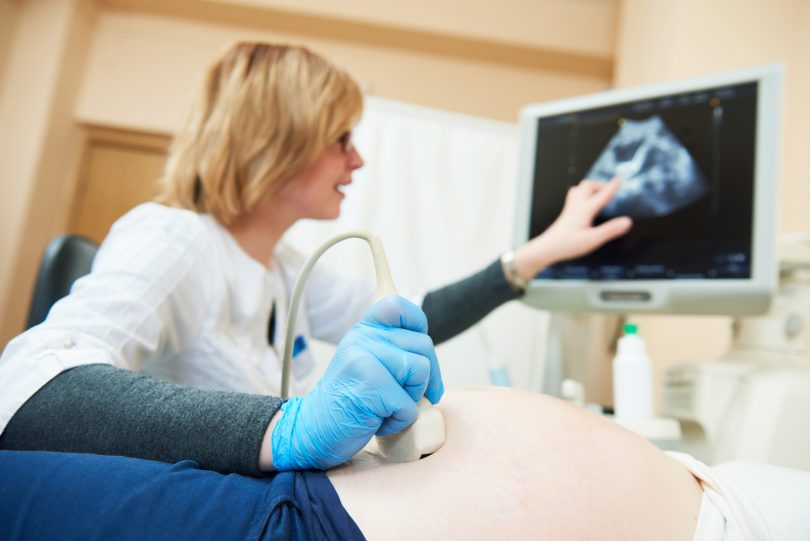For many moms-to-be—especially those older than 35—a big question often is, “Does my child have Down syndrome or another genetic disorder?”
No matter your age, prenatal testing can answer those questions and others so that doctors can help you develop the best plan, in case your child does have a condition—and your pregnancy suddenly goes from easy to high risk.
Augusta University Health maternal-fetal medicine specialist Dr. Paul Browne describes it as a “menu” for new moms-to-be: “There are a lot of different tests available, depending on your insurance and certain complications, but they include blood tests, ultrasound tests and invasive tests. All of them can look for different things in pregnancy.”
According to Dr. Browne, here are few common prenatal tests parents can consider:
NIPS Test
For: Women 35 and older or with a family history of genetic disease
When: 10 and 13 weeks
The Non-Invasive Prenatal Screening Test is a blood test that uses special genetic technology to assess risk of seven of the most common genetic diseases, including Down syndrome, Turner syndrome, Kleinfelter syndrome and others.
First Trimester Screening
For: All pregnant women
When: 11 to 14 weeks
Invented in England 15 years ago, a first-trimester screening requires a certified physician and ultrasound technician. This combination ultrasound/blood test examines your risk for a variety of birth defects, from Down syndrome to heart disease to Turner syndrome. The ultrasound looks for “blistering” at the baby’s neck, which could indicate certain birth defects, while the blood test measures levels of certain substances found during pregnancy.
Quad Test
For: All pregnant women
When: 15 to 18 weeks
This blood test looks at four chemicals in the mother’s blood that are transferred by pregnancy, then compares them to a baseline. If levels are too high or too low, it could mean a higher risk of a birth defect like Downs or spina bifida.
Ultrasound
For: All pregnant women
When: 15 to 20 weeks
At this point in pregnancy, the baby is far enough along that your health care provider can definitively say, “It’s a boy” or “It’s a girl.” But while they’re looking at gender, ultrasound technicians and doctors are also looking for any structural defects in the heart, lungs or kidneys.
My test was positive—What’s next?
If your blood test comes back positive, it’s important to remember that these tests only measure risk. “They mean that your child’s risk of having a birth defect is higher than average, but it doesn’t mean that your child has a birth defect,” emphasized Browne.
At this point, it’s important that you’re seen by a maternal-fetal medicine specialist and a genetic counselor, who can explain additional testing that’s needed and help you make a plan.
Tests that can confirm a birth defect are ultrasound or invasive testing, which can include amniocentesis or CVS (chorionic villus sampling).
Ultrasound can identify specific physical changes that mean your baby has a heart defect, a lung condition, kidney problems or other structural issues. Sometimes, there are surgical or medical treatments that can be done, even while your baby is still in utero, to help treat these problems. Your baby will also likely need surgery or medical treatments after he or she is born.
Amniocentesis or CVS are two different approaches to confirm various genetic conditions:
CVS can be done earlier in pregnancy, usually between 10 and 14 weeks, and takes a sample of placental cells through the vagina. It diagnoses chromosomal abnormalities including Down syndrome and Turner syndrome, as well as several hundred genetic disorders such as cystic fibrosis, sickle cell disease and Tay-Sachs disease.
Amniocentesis is typically done between 15 and 20 weeks and involves a needle inserted through the abdomen to draw a small sample of fluid from the bag of waters (amniotic fluid) surrounding the baby. Amniocentesis can diagnose the same chromosomal abnormalities and genetic disorders as CVS, in addition to neural tube defects.
Making a plan
If your child has a birth defect, your first step is to sit down with a maternal-fetal medicine specialist, who will go over the diagnosis and what it might mean for your and your family. Your doctor should share resources to help you understand what to expect, including what treatment or care might be needed.
If your child needs surgery or other medical care, your doctor will also arrange for you to be seen by specialists for a predelivery consultation. You may also meet with doctors and staff at the neonatal intensive care unit, since they will mostly likely take care of your child right after he or she is born. A dedicated children’s hospital, such as the Children’s Hospital of Georgia, will provide a full range of specialists and subspecialists trained to care for every aspect of your child’s care, including a top-level NICU, pediatric surgeons and physicians, pediatric nurses, pediatric therapists and much more.
“Anytime a parent gets back a lab result that indicates something may be wrong, it creates a personal crisis for their family,” said Browne. “They assume the worst—they don’t know if they’re going to lose their baby or if their child will have a permanent disability. Our goal is to make sure that parents know where the resources are, have access to the right people, and have a complete plan of what to do for their child to maximize their chance to do well.”




